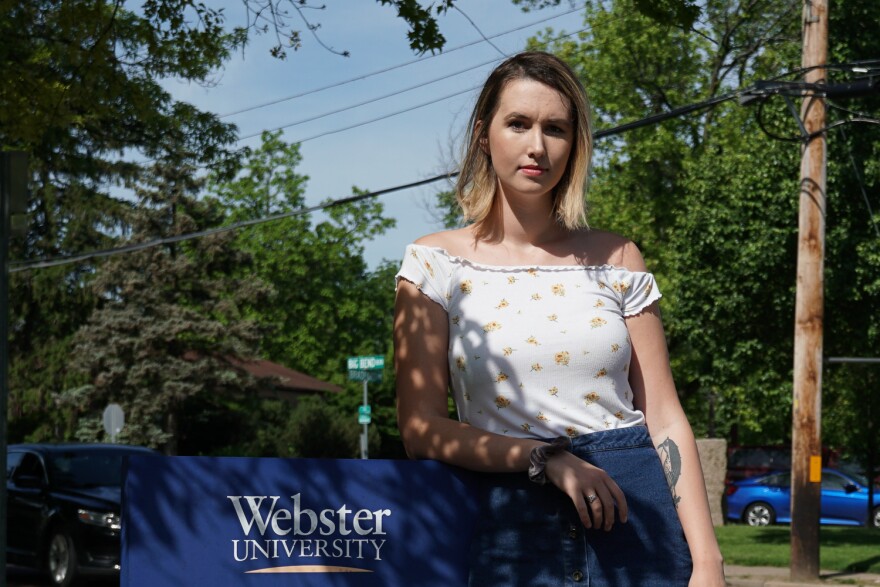Updated 10:45 a.m., May 21, to reflect new witness statements — The first time Tamsen Reed heard the rumors was over a text message from a soon-to-be roommate. Almost immediately, she began to feel trapped.
The rumors kept piling on. She’d hear them in her university classrooms. Once, a stranger shared them with one of Reed’s housemates, not realizing they lived together. Another time, a date brought them up to Reed.
“Oh my gosh,” her date said. “You’re the one Yates is talking about.”
Joshua Yates, the head of the Webster University’s game design program, was allegedly bragging to students and fellow professors that Reed was flirting with him and trying to seduce him. So Reed filed a Title IX sexual misconduct report with the university. That was more than a year ago.
Reed graduated last week. But the university isn’t even halfway through its 20-step process to investigate whether Yates sexually harassed her, she said.
A Webster University official said Friday the school has hired WorkPlace Partners, Inc., an independent firm, to audit the investigation. The university is now collecting statements about the investigation online.
More than fifteen students and several professors have joined Reed in publishing statements that recount dozens of incidents of sexual and professional misconduct involving Yates. Five students, including Reed, wrote that they felt belittled or discriminated against by Yates because of their gender. Others said they witnessed discriminatory remarks that he made about Reed and other students.
The letters describe a culture of fear, harassment and discrimination within Webster University’s game design program. Some said they’ve lost faith in the university to follow through on Title IX investigations.
In response, a university statement said that the school takes the allegations “very seriously.” University officials said that confidentiality laws prevent the school from revealing the status of the investigation or discuss personnel matters.
Losing faith in the university
Reed went public with her claims on May 9 with a thread of posts on Twitter that included a link to more than a dozen student and professor testimonies against Yates. Since then, more students have submitted statements.
According to a letter from one of Reed’s classmates, Yates “built up an extremely stupid idea that you were possibly trying to seduce him.” Another wrote that Yates discussed Reed’s clothing with other students, and asked him if Reed was “flirting with him to get a good grade.”
Reed’s academic advisor at the time, Lisa Brunette, wrote in a statement that Yates told her an unnamed female student “acted inappropriately toward him in full sight of other students.” He told her he asked other students to interfere.
“I now believe he was trying to mitigate what might happen if Reed and the student witnesses came forward,” Brunette wrote. Brunette left the game design program last year, in part because of Yates’ professional behavior, she wrote.
Another game design student, Chester Bacon, said that Yates asked Bacon invasive questions about his genitals and gender presentation, and that Yates initiated a conversation about his own dating history with a transgender woman. Bacon, who is transgender, said he felt pressure to tolerate the questions because Yates taught so many of his classes.

“I kind of just sat and suffered with it,” Bacon said. “During that time, I had to think, ‘Is he giving me A’s because he knows he’s being inappropriate and he doesn’t want me to say anything?’”
Last week, several days after students released their statements online against Yates, the university’s Title IX office called Bacon in and told him that he could file a complaint against Yates.
But Bacon said Reed’s experience has discouraged him from filing a complaint with the university.
“Even if there is a thorough investigation, I don’t trust anybody at Webster at this point. Even if they do their job, I don’t trust that whoever’s supposed to be looking at it is going to make the right decision,” he said. “Because at this point, all I’ve seen Webster trying to do is cover their own butts.”
A drawn-out, opaque process
After making an initial report and speaking with university officials, Reed filed her formal complaint through the university’s Title IX office in May 2018. The office enforces a 1972 federal civil rights law that bars schools from receiving federal funding if they discriminate against students because of their sex.
Colleges have been notoriously inconsistent with their enforcement of Title IX laws.
Webster University also has a localized policy, which enforces state laws regarding sexual assault and harassment. Under that policy, Reed should have been entitled to a prompt investigation and accommodations that would prevent the case from interfering with her education.
But Reed said her requests for investigation updates frequently went unanswered. She scrambled to fulfill graduation requirements after the Title IX office took months to complete paperwork for an independent study it instructed her to enroll in.
Webster’s policy says its Title IX office aims to complete investigations within 60 days, though the university has no legal obligation to that timeline.
Webster officials declined to answer how long, on average, the school takes to complete Title IX investigations. They also refused to say how many investigations the university has completed, though other local colleges, including the University of Missouri-St. Louis and Washington University, publish those numbers.
“There has to be a system in which people can come and avail themselves upon that they can have faith in,” said civil rights lawyer Sarah Jane Hunt. “And if it’s taking years for every complaint, or a lot of complaints, then they’re not going to do that, and they’re going to stop coming.”
Hunt has been taking cases like Reed’s since 2013 with the law firm Kennedy Hunt, P.C. She said that the longer an investigation takes, the harder it is for universities to gather information, because witnesses graduate and memories become fuzzy.
After reviewing Reed’s initial complaint and the testimonies that Reed gathered, Hunt said that she has a hard time understanding why the investigation would take more than a year.
“There were inappropriate comments made. They were reported. They were corroborated,” she said. “That’s not to say that’s the end of the rainbow. The accused has a right to defense and has the right for them to interview his witnesses. But I don’t know what about that takes 400 days.”
Hunt said there could be additional documents that the university has not released that may have complicated the case.
Who is Joshua Yates?

Yates founded a game development company, Accordion Games, in 2012. The company has published several games, mostly created by developers other than Yates. One, GloGo, was developed by students in the Webster University game design program.
Some students have accused Yates of profiting off the games they worked on for his classes.
Yates told the Riverfront Times that the students did not want the royalties their contracts entitled them to. But Matthew Parker, one of the student developers, said that’s a lie.
“At first, Josh said that there wasn’t enough money for Steam to pay us out. After that, he said that he would send the money as soon as he got it,” Parker wrote in an email. “Neither I nor my co-creator of GloGo ever refused payment.”
Yates has edited and deleted much of his online presence since Reed went public on May 9. Staff pages, about sections and profiles were deleted from Accordion Games’ website. The site now notes that the studio closed in 2018 — though as of Wednesday afternoon, the company still had products listed for sale on Steam, an online marketplace for games.
Yates has little traceable game-development experience. His LinkedIn page names his earliest work in the industry in 2008, as editor-in-chief of a gaming publication called P.u.G. MMO Magazine.
The magazine, self-published by Yates and his wife, published just one issue to an online magazine host in early 2010. By May 2011, internet archives show that the website had folded.
Yates wrote on his Accordion Games website that he created three games that “performed well within China” in 2011. The rights to any video games released in 2011 were not noted as personal property or a source of income in 2012 bankruptcy documents.
Yates did not respond to multiple requests for comment.
An industry problem
Reed and another witness first reported the harassment to then-Webster University game design professor Rob Santos. Santos then reported Reed’s account to Title IX office.
The Title IX coordinator asked Santos to teach Reed in an independent study so she didn’t have to enroll in Yates’ class, Santos said.
Santos said he thought it was “unfairly punishing” to remove Reed from class instead of selecting a different professor to teach the course. Taking the class alone prevented her from learning collaboratively — the main advantage of learning game design in a classroom instead of on the internet, he said.
Santos and Reed both said the Title IX office delayed approving paperwork for the independent study for several months, which added more stress to Reed's situation.
To Santos, the problems at Webster University reflect broader issues in the game industry.
In his own classes, he teaches about toxic work environments, exploitative contracts and sexual harassment. Harassment in the gaming world received national coverage during the Gamergate controversy in 2014, when a faction of gamers lambasted women developers with sexual attacks and death threats. Just last week, employees at popular development studio Riot Games protested the company’s sexual harassment and discrimination policies, which Reed referenced in her tweets about the alleged harassment at Webster University.
So it dismayed Santos to learn that his own students were reporting similar problems so early in their careers.
“They’re being beaten into thinking it’s the norm everywhere,” he said. “The very people who are supposed to protect students are the ones who are silencing them in this case.”
Santos resigned from the university on May 10 in support of students’ statements against the game design program. Santos said that he felt he could better support students from outside the university.
“Once that student graduates, sometimes these problems just disappear,” said Santos. “The school can just wait long enough for that student to leave, it goes quiet. And they never actually have to solve the problem.”
Webster University President Elizabeth Stroble wrote in a letter Thursday that the university would “rectify the situation” if an independent audit discovers that university policy was not fairly enforced.
Reed said she’s still considering alternate legal options and is looking for a lawyer in Missouri.
“I’m not just going to let this die out. I just have no faith that the university’s going to come to any conclusion,” Reed said. And after her experience, Reed said she fears for other students experiencing sexual harassment at Webster. “There’s no use turning to the university.”
_
Follow Kae on Twitter: @kmaepetrin
Send questions and comments about this story to feedback@stlpublicradio.org






